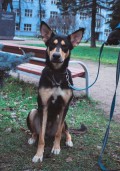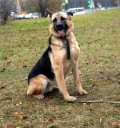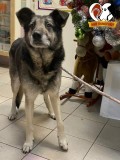Международная Конференция в Вильнюсе 2011 г.
5-6 мая 2011 г. в Вильнюсе прходила международная Конференция по защите животных.
В ней приняли участие представители Еврокомиссии, активисты охраны животных, представители международные организаций Латвии, Естонии, Польши, Германии, России и Белорусии.
Представители нашей организации, единственные из зоозащитных организаций России, были приглашены на Конференцию и выступили с докладом о ситуации охраны домашних животных в России.
На Конференции обсуждались проблемы безнадзорных животных и пути их решения. Представители каждой страны выступили с докладом о существующей в их стране\городе ситуации. Ниже приведены некоторые из них:
- Белоруссия
- Россия
Декларация первой конференции по благосостоянию животных в Балтийском регионе
The Conference on Animal Welfare in the Baltic region Responsible Ownership and the Best Practices

The conference gathered more than 200 hundred people from all around the world but mostly from Europe. Reports were read be such respectable officers, like Marlene Wartenberg (Director, European Policy Office, FOUR PAWS), Head of the Unit Animal Welfare DG SANCO, European Commission officer Andrea Gavinelli, the President of the Federation of Veterinarians in Europe (FVE) Walter Winding and many more.
The Opening of the Conference
 |
 |
 |
|
Petras Auštrevičius |
Kazys Starkevičius |
Adofo Sansolini |
"Lithuanian initiative to raise questions on animal welfare in the Baltic Sea region is a giant leap forward that encourages sharing best practices to develop a new attitude on human and animal relationship. The preparation of the new law on Animal Welfare in Lithuania will establish a solid foundation in the Animal Welfare field, therefore it must be enacted without any delay", as P. Auštrevičius stated. He was one of the people of whose initiative this conference was organized in Vilnius.
Petras Auštrevičius spotted that, in Lithuania we get concerned for animals only when something wrong happens and that this is one of the main reasons why we must enact a new law on animal welfare.
After P. Auštrevičius, the Minister of Agriculture Kazys Starkevičius spoke. "In the city, animals that are not wanted anymore find themselves on the street, they find shelter only in the countryside, as people there, since ancient times, are used to take care of animals" – said the Minister from the tribune.
The chairman of the conference was Adolfo Sansolini – a journalist and Animal Welfare Consultant.
Human – Animal Relationship
 |
 |
 |
 |
 |
|
|
Marlene Wartenberg |
Barbara Alessandrini |
Dr. Eva Waiblinger |
Dr. Walter Winding |
Andrea Gavinelli |
The first report was read by Marlene Wartenberg – the director of European Policy Office and the international organization FOUR PAWS. In her report she was happy that now the organization has more than 490 thousand supporters and that EU Council has finally attracted the attention on companion animal problems. Some time ago the EU was not responsible for them.
Barbara Alessandrini from Teramo, Italy (Head of Training Unit, Instituto "G. Caporale") emphasized the relevance of the education. "It is relevant to teach children at school how to treat animals" – said the speaker. Barbara is responsible for educational programmes (eLearning) and the preparation of the courses for veterinarians and other professionals involved in animal health care issues. In the city of Teramo more than one thousand students have completed the studies of Instituto "G. Caporale". Barbara also emphasized that scientific methods must be applied in order to make decisions on the subject of Animal Welfare: at first a research must be done, the data must be analyzed and only then it is possible to make a decision.
The head of Companion Animal Department, Swiss Animal Protection (SAP) Research Assistant Eva Waiblinger from Switzerland was happy that in such European countries as Switzerland, Germany and Great Britain there is no problem of stray dogs. This was confirmed later on by the speakers from other countries. E. Waiblinger presented the results of one survey. The interesting thing was that the survey showed that children prefer sharing their feelings with animals rather than people and a funny thing was that women pay more attention for their pets rather than their men!
Elected for the second term to be the president of the federation of veterinarians in Europe (FVE) Dr. Walter Winding was born in 1948 in Salzburg. He graduated the Vienna Veterinary Medicine University to a DVM in 1971 and since then he worked in various institutions that were involved in animal health care. In 2007 he was elected as the president of FVE. As a veterinary surgeon he is running a small animal practice until now. Dr. W. Winding emphasized the importance of the veterinarians' role on the animal welfare issue. "Veterinarians job isn't only about treating the animals. He communicates with the pet he is treating, with the owner and this means that he is communicating with the society itself. Thus, a veterinarian influences the health of the society, the animal welfare and conducts educational and prevention work. The doctors can influence the government and the politicians to enact certain laws that would ensure the animal welfare. Mandatory identification and registration is very important and the breeders should breed the animals not only to show how much they love them but also to take the responsibility for them" – said Dr. W. Winding.
The Situation of Companion Animals. National Perspectives.
 |
|
Eric van Tilburg |
1. The identification of dogs and cats;
2. Non treatment surgical interventions (f. e., cutting the tail for decorative reasons);
3. Stray animals and animal shelters;
4. Licensing for shops and breeders.
Since in 1986 enacted Animal Welfare Act Belgium conducts itself the strategy of animal protection which includes the following: a ban to sell animals in the market (1996), licensing system for pet shops, shelters and kennels (1997), mandatory dog identification and registration (1998), a ban for non treatment surgical interventions (2001), a ban to sell cats and dogs in the shopping centers (2007). At the moment Belgium is preparing a plan for cat sterilization.
 |
|
Ina Sokolska |
Since the year 2004 Lithuania has ratified a great deal of Conventions on Animal Welfare: European Convention for the protection of domestic animals (2004), European Convention for the protection of vertebrate animals for experimental and scientific purposes (2007), European Convention for the animals used in agriculture security (2003), the European Convention on animal transport (2003), the European Convention for the protection of animals for slaughter (2003). The current law of Lithuania, which provides the rules of animal care, their possession and use, can be found by clicking this link.
In March 2010, because of the initiative shown of Animal Welfare activists a working group was formed in order to prepare (correct) a new animal welfare law. Preparing law defines what animal care is, the competencies of local government (municipalities), a whole chapter is dedicated for the cases of animal cruelty, stricter requirements are made for animal registration and obligations are laid down for animal shelters.
Ina Sokolska suggested that stricter law on animal welfare would be enacted all over the EU and that animals would be seen as sentient beings. Now in every country the situation differs dramatically: in some countries animals are properly taken care of and in others the situation is very bad. Euthanasia for healthy animals should be banned.
 |
|
Sviatlana Kharevitch |
Luckily in old European Union countries animals are treated properly and they have very little trouble with stray animals. This was said by most of the speakers. For example, the Senior Veterinary Officer, Ministry of Agriculture and
 |
 |
|
Dr. Tiina Pullola |
Dr. Lillemor Wodmar |
The Secretary General, Swedish Animal Welfare Association Djurskydd Dr. Lillemor Wodmar from Sweden noted that there is only one shelter for dogs in Sweden in Stockholm and there are 27 cat shelters, which are administered by the shelter association. Dr. L. Wodmar is concerned that people buy animals as accessories to show off expensive designer clothes and high end jewellery or simply clothes and jewellery. Such animal is not allowed to move, he is constantly carried on hands. Another case of mistreatment is when a dog is being bought as a weapon.
In Denmark most popular pets after dogs and cats are rabbits. Shelters in Denmark belong to private organizations. Pet
 |
|
Sanne Rosbog |
The Animal Welfare Officer Madeleine Martin from Hessen State, Germany emphasized that it is crucial to involve more people with legal education into animal care. They put this statement in practice 15 years ago and got great results. It must be noted that in Germany animal welfare is ensured by the constitution and Germany has a separate law on dogs. The biggest possible fine for cruelty against animals is 15 thousand Euros or one and a half years in jail (in Sweden up to two years in jail). According to the speaker the biggest problems in Germany are as following: stray cats, dogs and cats with health issues breeding, sexual dog abuse and animal collecting.
 |
|
Madeleine Martin |
 |
|
Tatiana Sheina |
Practically every country has problems in the field of education. This was mentioned by most of the speakers. They encouraged education of correct animal treatment in high schools, Veterinary Universities and suggested to organize courses. Speaker from Denmark Sanne Rosbog suggested that courses of correct animal treatment should be mandatory not only before buying a dog but also a dog training course after buying a pet. It is very important that in the dog training courses the owner and his dog would work together.
European Convention for the protection of pet animals (ETS no 125) of the Council of Europe (CoE)
 |
|
David G. Pritchard |
Three non-binding Resolutions were adopted in 1995 which provide guidance on the Surgical operations (further controls on cropping of ears and tail docking), wild animals (details their needs and keeping) and breeding. The resolution on breeding requires breed associations of cats and dogs should take to account not only aesthetics but also behavior.
The Convention has detailed measures to protect the welfare of strays and to encourage the reduction of the number of stray animals. Stray control must be done as laid down in the Convention in a way which does not cause avoidable pain, suffering or distress. Capture must be done with minimum of force and minimum of mental suffering. Measures should be taken to reduce the number of strays but if animals need to be killed this must be done humanely. It is suggested that dogs and cats are permanently identified with links to details of their owners.
The End of the Conference
At the end of the Conference the speeches were delivered by the vice minister of Agriculture of Lithuania Mindaugas Kuklierius, Marlene Wartenberg, the director of State Food and Veterinary Service Dr. Jonas Milius and also the member of the Seimas Zita Užlytė.
 |
 |
| Dr. Jonas Milius and Petras Auštrevičius | Dr. Jonas Milius and Gudrun Koller |
Before the Press Conference, everyone got the Declaration of the Conference.
The Press Conference

 |
 |
|
Mindaugas Kuklierius |
Zita Užlytė |
The last part of the Conference was the Press Conference. Marlene Wartenberg stated that the dialogue with Lithuania began in 2010 August, was very productive and as a result this International Conference was organized. The vice Minister of Agriculture Mindaugas Kuklierius reminded that a new law on animal protection is being prepared and it will reach Seimas by the end of the month. Lithuania lacks experience in the field of animal welfare. This Conference was very valuable, gave a lot of new information which will be taken into account. Seimas member Zita Užlytė noted that this conference was attended by more than 200 people from 25 different countries. She said that even though some experiences were horrifying there were also a lot of positive experiences. For the first time in Lithuania the Ministry of Agriculture participated in the dialogue for well animal care. The Head of Unit Animal Welfare DG SANCO, European Commission Andrea Gavinelli said that this Conference was very useful for Lithuania – it will be much easier now to form a policy on the subject of Animal Protection. The Conference gave him a lot of new information that will soon be presented in Brussels.
Our site gave a question for Ina Sokolska "What is new in the developing animal protection law project?". She answered that for the first time the competences of the government institutions are clearly stated, for this a whole chapter is dedicated (responsible: the Ministry of Agriculture). Before, no one was responsible for creating this policy. It is planned to state clearly in the law, what is cruel behavior towards animals. There will be new articles on circus animals, animals for entertainment and shows. There will be a new law issued on farm animals, a new attitude towards aggressive dogs and other recommendations. This will definitely be state of the art law.
Petras Auštrevičius noted that now every EU country has a right to make its own laws on the subject of animal welfare. According to him, Europe needs one overall strategy, and the participation of EU must be both political and financial. This conference showed that the most important issues now are information, education, the installation of the best practice and positive attitude towards dogs formation.
Материалы взяты с сайта © www.Bimas.lt.



















